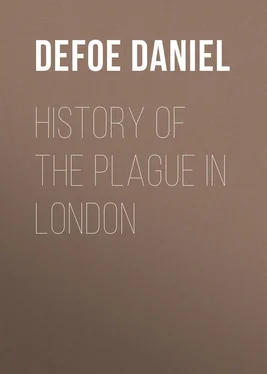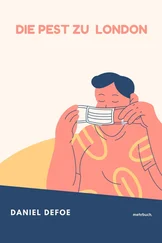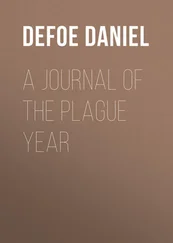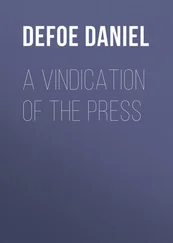Daniel Defoe - History of the Plague in London
Здесь есть возможность читать онлайн «Daniel Defoe - History of the Plague in London» — ознакомительный отрывок электронной книги совершенно бесплатно, а после прочтения отрывка купить полную версию. В некоторых случаях можно слушать аудио, скачать через торрент в формате fb2 и присутствует краткое содержание. Жанр: foreign_antique, foreign_prose, на английском языке. Описание произведения, (предисловие) а так же отзывы посетителей доступны на портале библиотеки ЛибКат.
- Название:History of the Plague in London
- Автор:
- Жанр:
- Год:неизвестен
- ISBN:нет данных
- Рейтинг книги:4 / 5. Голосов: 1
-
Избранное:Добавить в избранное
- Отзывы:
-
Ваша оценка:
- 80
- 1
- 2
- 3
- 4
- 5
History of the Plague in London: краткое содержание, описание и аннотация
Предлагаем к чтению аннотацию, описание, краткое содержание или предисловие (зависит от того, что написал сам автор книги «History of the Plague in London»). Если вы не нашли необходимую информацию о книге — напишите в комментариях, мы постараемся отыскать её.
History of the Plague in London — читать онлайн ознакомительный отрывок
Ниже представлен текст книги, разбитый по страницам. Система сохранения места последней прочитанной страницы, позволяет с удобством читать онлайн бесплатно книгу «History of the Plague in London», без необходимости каждый раз заново искать на чём Вы остановились. Поставьте закладку, и сможете в любой момент перейти на страницу, на которой закончили чтение.
Интервал:
Закладка:
That the sweeping and filth of houses be daily carried away by the rakers, and that the raker shall give notice of his coming by the blowing of a horn, as hitherto hath been done.
85 85 Heaps of rubbish.to be made far off from the City
That the laystalls be removed as far as may be out of the city and common passages, and that no nightman or other be suffered to empty a vault into any vault or garden near about the city.
That special care be taken that no stinking fish, or unwholesome flesh, or musty corn, or other corrupt fruits, of what sort soever, be suffered to be sold about the city or any part of the same.
That the brewers and tippling-houses be looked unto for musty and unwholesome casks.
That no hogs, dogs, or cats, or tame pigeons, or conies, be suffered to be kept within any part of the city, or any swine to be or stray in the streets or lanes, but that such swine be impounded by the beadle 86 86 A kind of parish constable.
or any other officer, and the owner punished according to the act of common council; and that the dogs be killed by the dog killers appointed for that purpose.
Forasmuch as nothing is more complained of than the multitude of rogues and wandering beggars that swarm about in every place about the city, being a great cause of the spreading of the infection, and will not be avoided 87 87 The writer seems to mean that the beggars are so importunate, there is no avoiding them.
notwithstanding any orders that have been given to the contrary: it is therefore now ordered that such constables, and others whom this matter may any way concern, take special care that no wandering beggars be suffered in the streets of this city, in any fashion or manner whatsoever, upon the penalty provided by law to be duly and severely executed upon them.
That all plays, bear baitings, 88 88 Fights between dogs and bears. This was not declared a criminal offense in England until 1835.
games, singing of ballads, buckler play, 89 89 Contests with sword and shield.
or such like causes of assemblies of people, be utterly prohibited, and the parties offending severely punished by every alderman in his ward.
That all public feasting, and particularly by the companies 90 90 The guilds or organizations of tradesmen, such as the goldsmiths, the fishmongers, the merchant tailors.
of this city, and dinners in taverns, alehouses, and other places of public entertainment, be forborne till further order and allowance, and that the money thereby spared be preserved, and employed for the benefit and relief of the poor visited with the infection.
That disorderly tippling in taverns, alehouses, coffeehouses, and cellars, be severely looked unto as the common sin of the time, and greatest occasion of dispersing the plague. And that no company or person be suffered to remain or come into any tavern, alehouse, or coffeehouse, to drink, after nine of the clock in the evening, according to the ancient law and custom of this city, upon the penalties ordained by law.
And for the better execution of these orders, and such other rules and directions as upon further consideration shall be found needful, it is ordered and enjoined that the aldermen, deputies, and common councilmen shall meet together weekly, once, twice, thrice, or oftener, as cause shall require, at some one general place accustomed in their respective wards, being clear from infection of the plague, to consult how the said orders may be put in execution, not intending that any dwelling in or near places infected shall come to the said meeting while their coming may be doubtful. And the said aldermen, deputies, and common councilmen, in their several wards, may put in execution any other orders that by them, at their said meetings, shall be conceived and devised for the preservation of his Majesty's subjects from the infection.

I need not say that these orders extended only to such places as were within the lord mayor's jurisdiction: so it is requisite to observe that the justices of peace within those parishes and places as were called the "hamlets" and "outparts" took the same method. As I remember, the orders for shutting up of houses did not take place so soon on our side, because, as I said before, the plague did not reach to this eastern part of the town at least, nor begin to be violent till the beginning of August. For example, the whole bill from the 11th to the 18th of July was 1,761, yet there died but 71 of the plague in all those parishes we call the Tower Hamlets; and they were as follows: —
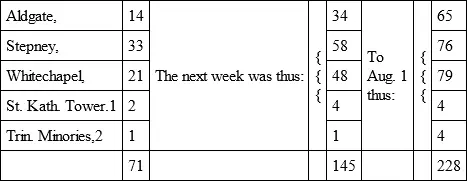
1. St. Katherine's by the Tower.
2. Trinity (east of the) Minories. The Minories (a street running north from the Tower) was so designated from an abbey of St. Clare nuns called Minoresses. They took their name from that of the Franciscan Order, Fratres Minores, or Lesser Brethren.
It was indeed coming on amain, for the burials that same week were, in the next adjoining parishes, thus: —

3. St. Luke's.
4. St. Botolph's, Bishopsgate.
5. St. Giles's, Cripplegate.
This shutting up of houses was at first counted a very cruel and unchristian method, and the poor people so confined made bitter lamentations. Complaints of the severity of it were also daily brought to my lord mayor, of houses causelessly, and some maliciously, shut up. I cannot say but upon inquiry many that complained so loudly were found in a condition to be continued; and others again, inspection being made upon the sick person, and the sickness not appearing infectious, or, if uncertain, yet, on his being content to be carried to the pesthouse, was 91 91 Were.
released.
As I went along Houndsditch one morning, about eight o'clock, there was a great noise. It is true, indeed, there was not much crowd, because the people were not very free to gather together, or to stay long together when they were there, nor did I stay long there; but the outcry was loud enough to prompt my curiosity, and I called to one, who looked out of a window, and asked what was the matter.
A watchman, it seems, had been employed to keep his post at the door of a house which was infected, or said to be infected, and was shut up. He had been there all night, for two nights together, as he told his story, and the day watchman had been there one day, and was now come to relieve him. All this while no noise had been heard in the house, no light had been seen, they called for nothing, sent him of no errands (which used to be the chief business of the watchmen), neither had they given him any disturbance, as he said, from Monday afternoon, when he heard a great crying and screaming in the house, which, as he supposed, was occasioned by some of the family dying just at that time. It seems the night before, the "dead cart," as it was called, had been stopped there, and a servant maid had been brought down to the door dead; and the "buriers" or "bearers," as they were called, put her into the cart, wrapped only in a green rug, and carried her away.
Читать дальшеИнтервал:
Закладка:
Похожие книги на «History of the Plague in London»
Представляем Вашему вниманию похожие книги на «History of the Plague in London» списком для выбора. Мы отобрали схожую по названию и смыслу литературу в надежде предоставить читателям больше вариантов отыскать новые, интересные, ещё непрочитанные произведения.
Обсуждение, отзывы о книге «History of the Plague in London» и просто собственные мнения читателей. Оставьте ваши комментарии, напишите, что Вы думаете о произведении, его смысле или главных героях. Укажите что конкретно понравилось, а что нет, и почему Вы так считаете.
